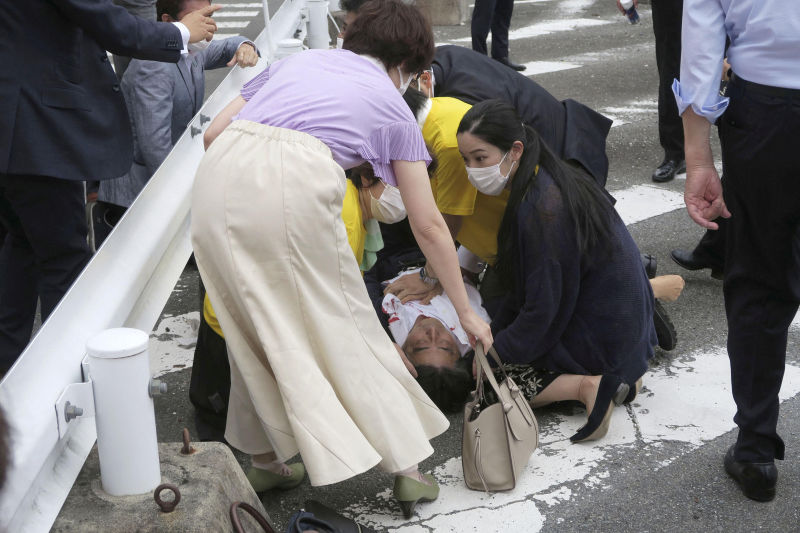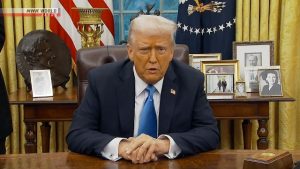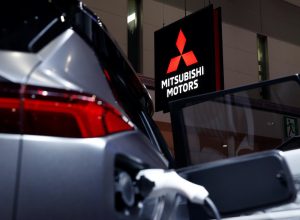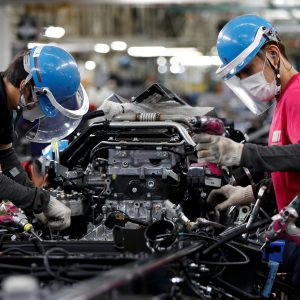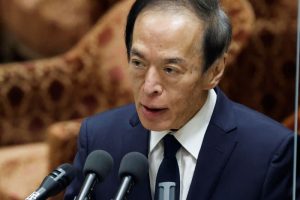Japan’s former prime minister Shinzo Abe died after being shot twice while delivering a campaign speech on Friday, shocking a nation where guns are strictly controlled.
Two sounds like gunshots were heard at the time, and suspect was detained at the scene, broadcaster NHK said.
He appeared to have been shot in the back and neck, broadcaster TBS said. Yomiuri Shimbun reported that Abe, 67, appeared to have been gunned down from behind.
Reuters said several others were injured.
NHK showed footage of Abe’s wife, Akie, on her way by train to the hospital in the western city of Nara, where he was treated.
Airo Hino, political science professor at Waseda University, said such a shooting was unprecedented in Japan. “There has never been anything like this,” he said.
The suspect is 41-year-old Tetsuya Yamagami, who lives in Nara, according to Yomiuri. He was arrested on suspicion of attempted murder after firing at Abe from close range. That charge is expected to be elevated to murder.
Video and still footage after the shooting showed what appeared to be a homemade double-barrelled weapon.
Japan’s Nikkei stock market index cut some of its early gains after the shooting. It had risen 0.5% in early afternoon trading after climbing as much as 1.4% earlier in the session. The broader Topix rose nearly 0.6%.
Youngest PM
Abe was best known for his signature “Abenomics” policy that featured bold monetary easing and fiscal spending. He also bolstered defence spending after years of declines and expanded the military’s ability to project power abroad.
In a historic shift in 2014, his government reinterpreted the postwar, pacifist constitution to allow troops to fight overseas for the first time since World War Two.
The following year, legislation ended a ban on exercising the right of collective self-defence, or defending a friendly country under attack.
Abe, however, did not achieve his long-held goal of revising the US-drafted constitution by writing the Self-Defence Forces, as Japan’s military in known, into the pacifist Article 9.
He was instrumental in winning the 2020 Olympics for Tokyo, cherishing a wish to preside over the Games, which were postponed by to 2021 because of the Covid-19 pandemic.
Abe first took office in 2006 as Japan’s youngest prime minister since World War Two. After a year plagued by political scandals, voter outrage at lost pension records, and an election drubbing for his ruling party, Abe quit citing ill health.
He became prime minister again in 2012. He resigned again in 2020, citing worsening health. He suffered from ulcerative colitis, a painful digestive condition.
Abe hails from a wealthy political family that included a foreign minister father and a grandfather who served as prime minister.
First elected to parliament in 1993 after his father’s death, Abe rose to national fame by adopting a tough stance toward unpredictable neighbour North Korea in a feud over Japanese citizens kidnapped by Pyongyang decades ago.
Though Abe also sought to improve ties with China and South Korea, where bitter wartime memories run deep, he riled both neighbours in 2013 by visiting Tokyo’s Yasukuni Shrine, seen by Beijing and Seoul as a symbol of Japan’s past militarism.
In later years in office, Abe refrained from visiting in person and instead sent ritual offerings.
Antony Blinken, US secretary of state, said the shooting was a “very, very sad moment”. Former US president Donald Trump, with whom Abe was close, told his Truth Social followers that the shooting was “a tremendous blow to the wonderful people of Japan”.
Yen Rises in Safe-Haven Moves
The yen rose by nearly 0.5% against the US dollar on Friday, in what appeared to be safe-haven buying.
Abe had been speaking on behalf of his ruling Liberal Democratic Party (LDP), which is hoping for a strong showing in upper house elections on Sunday.
A solid victory would give Prime Minister Fumio Kishida a firmer grip on the party and allow him to emerge from Abe’s shadow.
If he does as well as polls predict, Kishida will bolster his chances of leading the LDP into the next election, which must be held by late 2025.
A consolidation of power would give Kishida the opportunity to boost defence spending and perhaps revise the pacifist constitution, something that even the hawkish Abe, who stepped down in 2020, was not able to accomplish.
Kishida said it was premature to talk about the election campaign in the wake of the Abe shooting, but the LDP had summoned its parliamentarians to Tokyo.
In 2007, the mayor of Nagasaki was shot and killed by a yakuza gangster. There was an assassination attempt against former prime minister Morihiro Hosokawa in 1994.
Inejiro Asanuma, then head of the Japan Socialist Party, was assassinated during a speech in 1960 by a right-wing youth. In 1932 then prime minister Tsuyoshi Inukai was assassinated by rebellious naval officers after just a year in office.
- Reuters, with additional editing by George Russell
READ MORE:
Japan’s JCV Sells Blacklisted SenseTime’s Facial Tech in US
Cyber Bullies Face Year in Jail Under New Japan Law – Kyodo
Australian Coal Royalty Rise Shocks Japanese Investors




